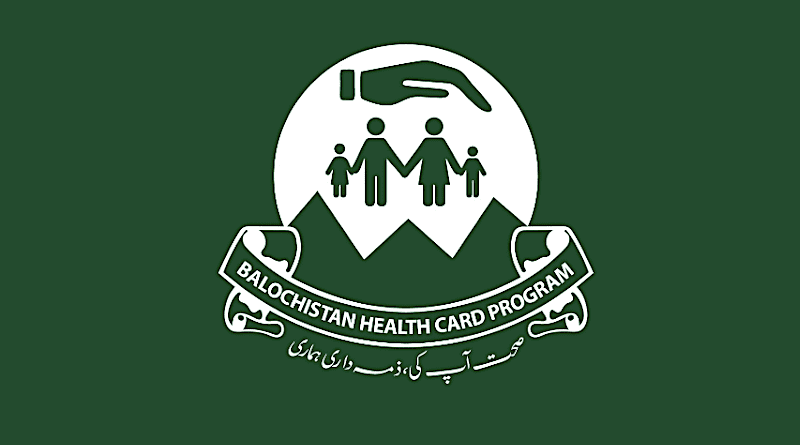Reviving Healthcare: The Role Of Health Cards In Balochistan – OpEd
By Hamza Nasir
Balochistan, Pakistan’s largest province in terms of land area, has been grappling with the persistent challenge of providing adequate healthcare to its residents. Shortages of hospitals, substandard healthcare facilities, and limited awareness of available healthcare options have compounded the issue. However, recent years have brought a glimmer of hope to Balochistan with the introduction of “health cards.”
Health cards have emerged as a lifeline for individuals in need of medical treatment. These specialized cards offer financial assistance, alleviating the burden of high medical costs. This initiative has been a lifeline for those who previously struggled to afford essential healthcare services.
The implementation of health cards faced some delays but became possible during the tenure of the caretaker government, which took the initiative to address Balochistan’s healthcare challenges. Both the previous and current government administrations have taken proactive measures to expand the reach and effectiveness of the Health Card Program. They have allocated resources and funding to ensure the program’s sustainability and broaden its reach.
Dr. Muhammad Khan Jogezai, as a caretaker minister of health, the government of Balochistan, played a pivotal role in addressing the challenges and bottlenecks that were hindering the smooth implementation of the Health Card Program. Their concerted efforts and dedication were instrumental in making it possible for the general populace to gain access to this essential health card, which, in turn, granted them the privilege of receiving cost-free medical treatment across the entire nation.
Dr. Muhammad Khan Jogezai, a highly respected figure in Balochistan’s healthcare sector, has played a pivotal role in advancing these efforts. Dr. Jogezai, a seasoned healthcare professional with an in-depth understanding of Balochistan’s unique healthcare challenges, has been a vocal advocate for enhancing the Health Card Program and has made significant contributions to its improvement. His expertise and unwavering dedication have been instrumental in fostering collaboration between government institutions and healthcare providers to ensure that health cards effectively address the healthcare needs of Balochistan’s residents.
Balochistan health card, or just an ID card. If you have the local of Balochistan and have a disease like cancer or kidney failure, you can visit any of the 1200 listed hospitals in Balochistan and Pakistan for free treatment. No form will have to be filled out; no documents are required. In Quetta city, you can also get free treatment at the top 30 hospitals. Treatment for up to 1 million people in a year is absolutely free.
Several vital hospitals in Balochistan, including Civil Hospital Quetta, Bolan Medical Complex Hospital, Sandeman Provincial Hospital and other private hospitals, now cater to individuals with health cards. This means that people can access a wide range of medical services, from routine check-ups to surgeries, without facing overwhelming financial burdens. This marks a positive step toward enhancing healthcare accessibility in the province.
State Life Insurance’s efforts in conjunction with the Health Card Program, particularly with Domki, can provide additional financial security for cardholders. This collaboration can offer a safety net for individuals and families facing medical expenses, reinforcing the overall effectiveness of the Health Card Program. State Life’s cost-effective health insurance provides extensive coverage through a 1,200+ hospital network, offering cashless services and quick response during emergencies. Their paperless claims process guarantees prompt payments, solidifying their leadership in healthcare insurance and prioritizing customer convenience.
Confirm eligibility by texting your CNIC to 8500 for up to PKR 1,000,000 per year in medical coverage. Seek treatment at State Life hospitals, contact the 24/7 call center at 0800-01001, and download the Balochistan Health Card app for support.
A significant portion of Balochistan’s population remains unaware of these health cards, emphasizing the critical need for increased awareness. In this regard, Hamza Shafqat, the commissioner, also tweeted and focused on the fact that the majority of people in Balochistan are unaware of the health card services. He said that “Today is the 3rd day since it has started in Quetta, but only 7 people have availed of this facility.” However, despite the progress made, challenges persist. Raising awareness about health cards among the population is crucial. Many eligible individuals remain uninformed about the benefits and how to obtain a health card. Efforts should include information campaigns, community outreach, and partnerships with local organizations to ensure that people are aware of this valuable resource and how to access it.
While there has been significant progress, it is clear that more needs to be done to fully unlock the potential of health cards in Balochistan. Continued collaboration between the government and the private sector, along with the dedication of committed individuals, will be instrumental in driving positive change in the healthcare sector. These passionate efforts, both from individuals and collectively, are essential for expanding awareness, improving healthcare infrastructure, and ensuring that health cards effectively meet the healthcare needs of Balochistan’s residents.

